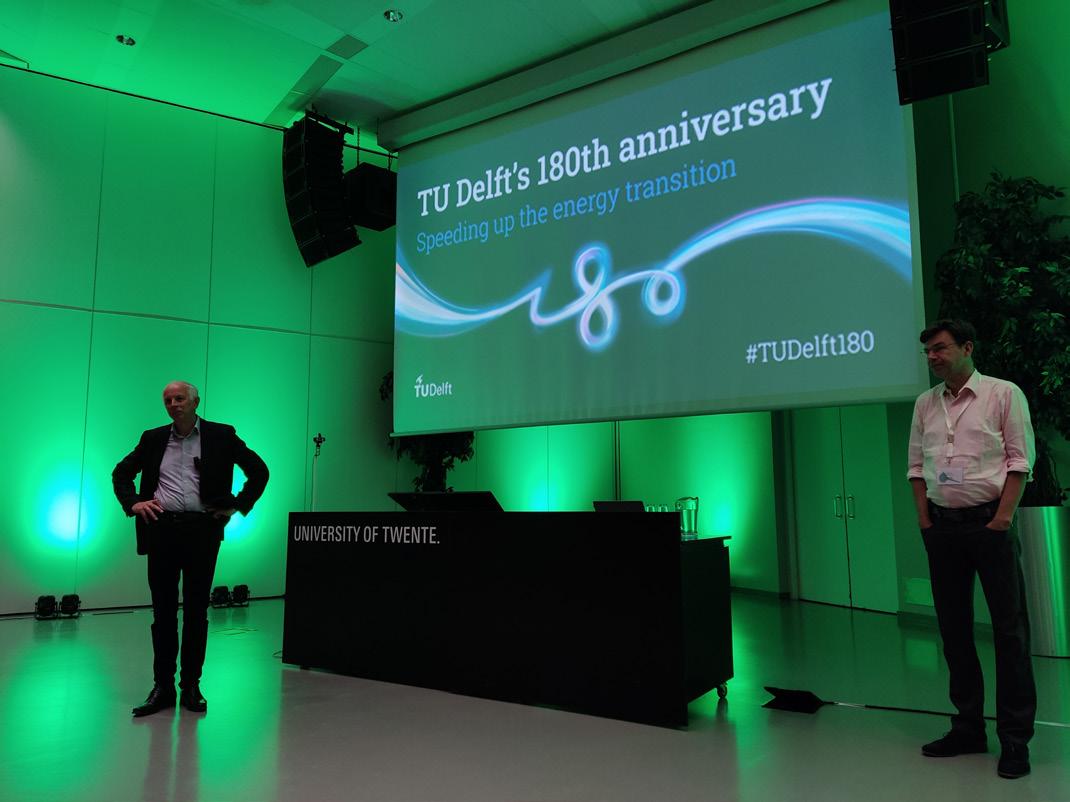
3 minute read
Symposium ‘Road to the Future’
from The CaT 39-2
The symposium committee of the Chemical Science and Engineering study association C.T.S.G. Alembic has organised a symposium on the 10th of May, 2021 at our beautiful university. The theme of this event was “Road to the future” which emphasised energy sustainability and challenges. In recent years, the energy demand has been increasing along with its obstacles that are not easily solvable. However, the symposium explored some of these concepts and challenges from different points of view to get a better understanding of the most sustainable way to the future.
The organisation has been busy setting up the whole event for over a year. Somewhere in April 2021 the organisation came together and after this day the symposium committee was set, consisting of Tim Schuttevaer, Niels Hakkert, Jelle van Beek, Jane Glenza, Maarten de Groot and Gerard Groot Obbink. During the first brainstorm session, we made the drawings for the day. Quickly after we thought of the theme ‘Road to the Future’. To explore the different routes for the future all aspects have to be considered, which is why we tried to get as many as different perspectives on the energy demand such as policies, energy storage and energy carriers. To cover these topics, we came to four different speakers: Prof. Dr. Kornelis Blok, Prof. Dr. Sascha Kersten, Dr. Ir. Evert Leijenhorst and Prof. Dr. Frederik Wurm. With these speakers, we had a nice mix of people from our university, other universities and companies.
Advertisement
After finding the speakers it was time for the next step in the preparations, which was not without road bumps. On multiple occasions, we were afraid the day would end up being awful. For example, a year in advance we made reservations for the college rooms, but when the moment came the office booking screwed us over by saying they did not have rooms for us. Through a lot of pushing and complaining they found rooms for us during the day to give the workshops. It was a tough fight but we made it!
Another fight which had to be fought was to get the schedule of the bachelor students free. Our request to schedule the symposium was sent out a year in advance as well. Logically, we hoped our request was granted to clear a free day for the bachelor students such that they can go to the symposium. However, when the schedule of the module came we discovered something different. After talking to the lecturers we managed to get most of the lectures free. For this, we should also especially thank Evert Houwman as he offered to pay for the symposium and make it mandatory for his students.
At this point, we had most of the arrangements set. The speakers were ready. The schedule is free. The rooms are set. But the workshops still had to be found, which was again a major road bump. Maarten had sent a lot of mails trying to find companies which were interested in providing an interesting workshop. In the end, we found four organizations interested in giving workshops during the symposium: DSM, Convergence, the Green Team Twente and Zeton. Unfortunately due to personal reasons, the DSM workshop was cancelled a day before the symposium. Therefore, the division of the workshops had to be remade so it would fit everyone. Although one workshop was cancelled last-minute, everyone fitted nicely in the remaining three.
The schedule eventually was filled with four talks and two rounds of workshops. To even get more initiatives on the road to the future, we wanted to give smaller organisations and companies a place during the lunch break. So we found three organisations that were enthusiastic about the stands: Torwash, Greenhub Twente and Looptas. Looptas could also be recognised at the start of the event from the goodie bags received at the start.
After going over the symposium’s preparation, it is time to look back at the day itself. I remember walking into Hal B that morning with a loud alarm going off, not knowing where it was coming from. Eventually, I found people working on the alarm system. So my day started well, thoroughly being stressed out and thinking the alarm could go off anytime that day. Luckily, the tests were only taking place before the official opening hours of the building. During setting up everything the first guests already walked in and with that also the first complaints, since there was no coffee in the morning for the reception. At 9.00 the symposium officially started with the first words of the day chairman Guido Mul.
Looking back, I think we can conclude the symposium was a great success considering the only complaint was the absence of coffee at the start. This could not have happened without my fellow committee members, the speakers, the participants and everyone else involved in setting up the day.











